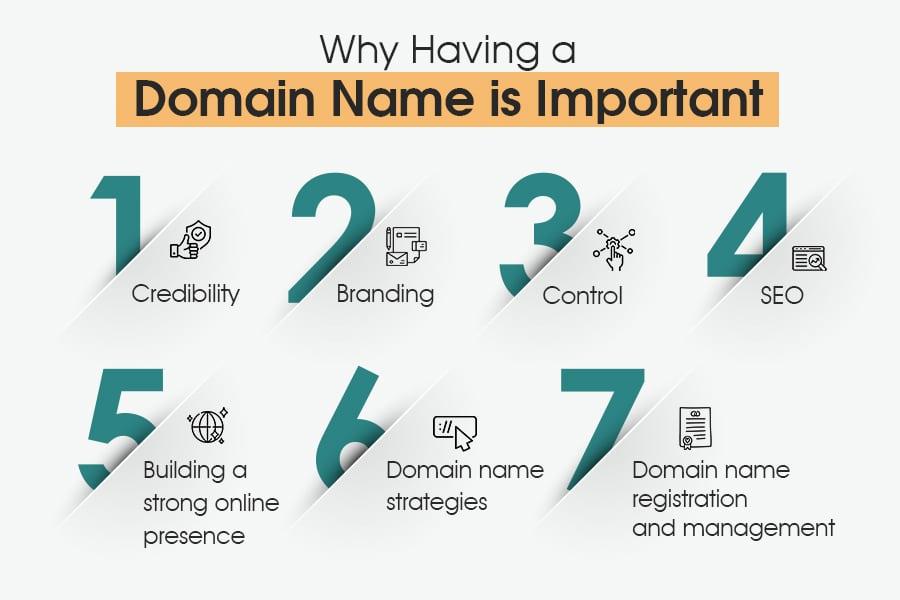Table of Contents
- Understanding the Importance of a Strong Domain Name in Canada
- Choosing the Right Domain Extension for Your Canadian Website
- Top Domain Registrars in Canada: A Detailed Comparison
- Essential Tips for Securing Your Domain Name Effectively
- Navigating the Process of Transferring Your Domain Name in Canada
- Q&A
- To Conclude


Understanding the Importance of a Strong Domain Name in Canada
Choosing the right domain name can set the tone for your online presence. In a rapidly evolving digital landscape, a strong domain name is more than just a web address; it’s an asset that can significantly influence your brand’s success. It encapsulates your business identity and creates first impressions that are often lasting. In Canada, where competition is fierce across various sectors, a memorable domain can make a substantial difference in attracting potential customers. As you consider your options, think about how your domain can convey your brand’s purpose, values, and uniqueness.
When selecting a domain name, it’s essential to keep in mind its relevance and simplicity. A domain name that reflects your business while being easy to spell and pronounce promotes better recognition and recall. Here’s why it matters:
- Brand recognition: A clear domain fosters trust and authority.
- SEO benefits: Incorporating relevant keywords can improve your search engine ranking.
- Social media compatibility: Consistent naming across platforms enhances your brand identity.
Additionally, localizing your domain name can give you a competitive edge. In Canada, using a country code top-level domain (ccTLD) like .ca signals to users that your business is local, potentially increasing their trust and willingness to engage. Below is a comparison of domain types:
| Domain Type | Description | Use Case |
|---|---|---|
| .com | Global recognition and credibility. | General business and commercial use. |
| .ca | Denotes Canadian presence. | Local businesses targeting Canadian customers. |
| .org | Used primarily by non-profit organizations. | Charitable organizations and foundations. |
Choosing the Right Domain Extension for Your Canadian Website
is a crucial step that can significantly impact your online presence and brand identity. While .com remains popular globally, considering local extensions can enhance your connection with Canadian audiences. .ca, for instance, establishes your website as a Canadian entity, which can resonate positively with local customers and boost trust. This extension can also improve your visibility in local search results, making it easier for Canadian users to find your services. When selecting a domain extension, it’s essential to evaluate your target demographic and business model. Here are some popular choices to consider:- .ca – Ideal for businesses and services specifically targeting Canadian citizens.
- .com - The go-to choice for global reach, although it may lack regional specificity.
- .net – Often used by internet service providers and tech companies, it can convey a sense of technology-focused innovation.
- .info - Useful for informational websites, it signals to users that your website aims to provide valuable content.
- .co – Great for startups and entrepreneurial ventures, this extension has gained popularity among businesses wanting a modern appeal.


Top Domain Registrars in Canada: A Detailed Comparison
When it comes to purchasing a domain name in Canada, there’s no shortage of registrars to choose from. The decision on which registrar to select can significantly impact your online presence and user experience. Here are some standout options that are known for their competitive pricing, reliability, and extensive services:
- GoDaddy: One of the most recognized names globally, GoDaddy offers a user-friendly interface and 24/7 customer support. They often run promotions and their extensive database of domain names makes it easy to find the perfect fit.
- Namecheap: Known for their budget-friendly pricing, Namecheap also provides solid security features and a straightforward management dashboard. Their commitment to customer support is another aspect that users appreciate.
- Bluehost: While primarily known as a hosting provider, Bluehost also excels in domain registration services. Their bundling options make it a convenient choice for those looking to establish a complete web presence.
For those seeking to compare features and offerings, consider the following table outlining key aspects of popular registrars:
| Registrar | Starting Price | Free Features |
|---|---|---|
| GoDaddy | $2.99/yr | Domain forwarding, DNS management |
| Namecheap | $8.88/yr | WHOIS privacy protection, free SSL |
| Bluehost | $11.99/yr | Free domain with hosting purchase, free SSL |
Each of these registrars offers something unique, be it affordability, feature richness, or supplementary services. By carefully evaluating your requirements and understanding what each registrar provides, you can ensure that your choice aligns with your long-term goals for your online presence. Whether you’re starting a blog, launching an online store, or creating a portfolio, selecting the right registrar is a foundational step in building your digital identity.


Essential Tips for Securing Your Domain Name Effectively
Securing your domain name is a critical step in establishing your online presence. To start, choose a domain name that reflects your brand identity and is easy to remember. Opt for a name that is short, clear, and descriptive of your business or project. Avoid using numbers or hyphens, as they can create confusion and make it harder for users to find you. Ensure the availability of your desired domain through various domain registration services to facilitate a smooth acquisition process.
Next, consider registering your domain with multiple extensions. Besides the familiar .com, think about acquiring relevant local or niche-specific domains such as .ca for Canada. This strategy not only protects your brand from potential imitators but also enhances your credibility within specific markets. It is advisable to monitor the expiration dates of your domains and set up auto-renewal if your registrar offers this feature, to avoid losing your valuable online real estate.
implementing domain privacy protection can be a smart move. This service hides your personal information from the public WHOIS database, safeguarding you against spam and potential cyber threats. In tandem with this, it’s essential to keep your domain registrar account secure by utilizing strong passwords and enabling two-factor authentication. These proactive measures greatly reduce the risk of unauthorized access and help maintain your domain’s integrity.


Navigating the Process of Transferring Your Domain Name in Canada
Transferring your domain name in Canada may seem daunting, but with a clear understanding of the steps involved, you can smoothly navigate the process. First, ensure your domain name is eligible for transfer. Domains are typically locked for a certain period after registration, so verify that your domain is not in this “lock period.” Most registrars allow you to easily check this status through their management panel. If your domain is locked, you will need to unlock it to proceed. Here’s what you need to do:
- Unlock your domain: Access your current registrar’s domain management settings.
- Retrieve the authorization code: This unique code is necessary for the transfer process.
- Update contact information: Ensure that the email and contact details associated with your domain are accurate.
Once you have prepared your domain for transfer, choose a new registrar that suits your needs. Compare factors such as pricing, customer support, and user features. When you have made your selection, initiate the transfer by entering your domain name and the authorization code on the new registrar’s transfer page. Most transfers take between 5 to 7 days to complete, but you can track the status via your new registrar’s user interface. Remember to review any renewal fees or policies associated with the new registrar.
| Registrar Name | Transfer Fee | Customer Support |
|---|---|---|
| Registrar A | $15.99 | 24/7 Live Chat |
| Registrar B | $12.99 | Email Support |
| Registrar C | $10.50 | Phone & Chat |
After you have submitted the transfer request, be on the lookout for confirmation emails from both the current and new registrars. You often need to confirm acceptance and validate your transfer request through the email link provided. Take note to keep the communication lines open during this period to avoid any unexpected delays. Following these steps will guide you successfully through your domain name transfer process in Canada.
Q&A
Q&A: Buying a Domain Name in Canada
Q1: Why should I consider buying a domain name in Canada? A1: Buying a domain name in Canada offers several advantages. Firstly, it helps localize your business, making it more relatable to Canadian customers. A “.ca” domain also conveys trust and credibility, as it is reserved for Canadian businesses and individuals. Furthermore, having a Canadian domain can improve your SEO efforts when targeting the Canadian market, potentially increasing your visibility on search engines.Q2: What is the process for purchasing a domain name in Canada? A2: The process is fairly straightforward! Start by researching and selecting a domain name that reflects your brand or business. Once you have a list of potential names, check their availability using a domain registrar’s search tool. If your desired name is available, follow the registrar’s prompts to create an account, fill in your details, and complete your purchase. Don’t forget to consider options for domain privacy and hosting services if needed.
Q3: Are there specific rules or regulations for .ca domains? A3: Yes, .ca domains have specific eligibility requirements set by the Canadian Internet Registration Authority (CIRA). To register a .ca domain, you must be a Canadian citizen, a permanent resident, or a business registered in Canada. Additionally, the domain name must have a connection to Canada, which can be demonstrated through your business activities or personal relations to the country.
Q4: What should I look for in a domain registrar in Canada? A4: When selecting a domain registrar, consider reliability, customer support, pricing, and the additional features they offer. Look for a registrar that provides easy domain management tools, transparent pricing with no hidden fees, and responsive customer service. It’s also beneficial if they offer extra services like web hosting, email accounts, or website builders.
Q5: How much should I expect to pay for a domain name? A5: The price of a domain name can vary widely based on several factors, including the domain extension (like .ca), the registrar, and the length of registration you choose. On average, you can expect to pay between $10 to $30 per year for a standard .ca domain. Special or premium domains may cost significantly more.
Q6: Can I buy a domain name even if I’m not Canadian? A6: While you don’t have to be Canadian to buy a domain name, you will need to associate your registration with someone who meets the eligibility requirements. Some registrars may also allow you to register a .ca domain as a foreign entity if you can demonstrate some business presence or contact in Canada. It’s best to consult specific registrar guidelines or CIRA for clarity.
Q7: What happens if someone else buys my desired domain name? A7: If someone else registers your desired domain name, you may have a few options. You can wait to see if the owner decides to sell it, or you could reach out directly to them to negotiate a purchase. If it’s crucial to your brand, consider variations of the name or alternative extensions (.com, .net, etc.) that convey a similar identity.
Q8: How do I maintain my domain name after purchase? A8: Once you have purchased your domain name, keep track of your registration renewal dates to avoid losing it. Most registrars offer automatic renewal options to simplify this process. Additionally, manage your domain settings regularly, including DNS records, to ensure your website runs smoothly. Don’t forget to keep your contact information updated with your registrar to receive important notifications.
By considering these questions and answers, you’ll be well-equipped to navigate the process of buying a domain name in Canada and make informed decisions that benefit your online presence!

